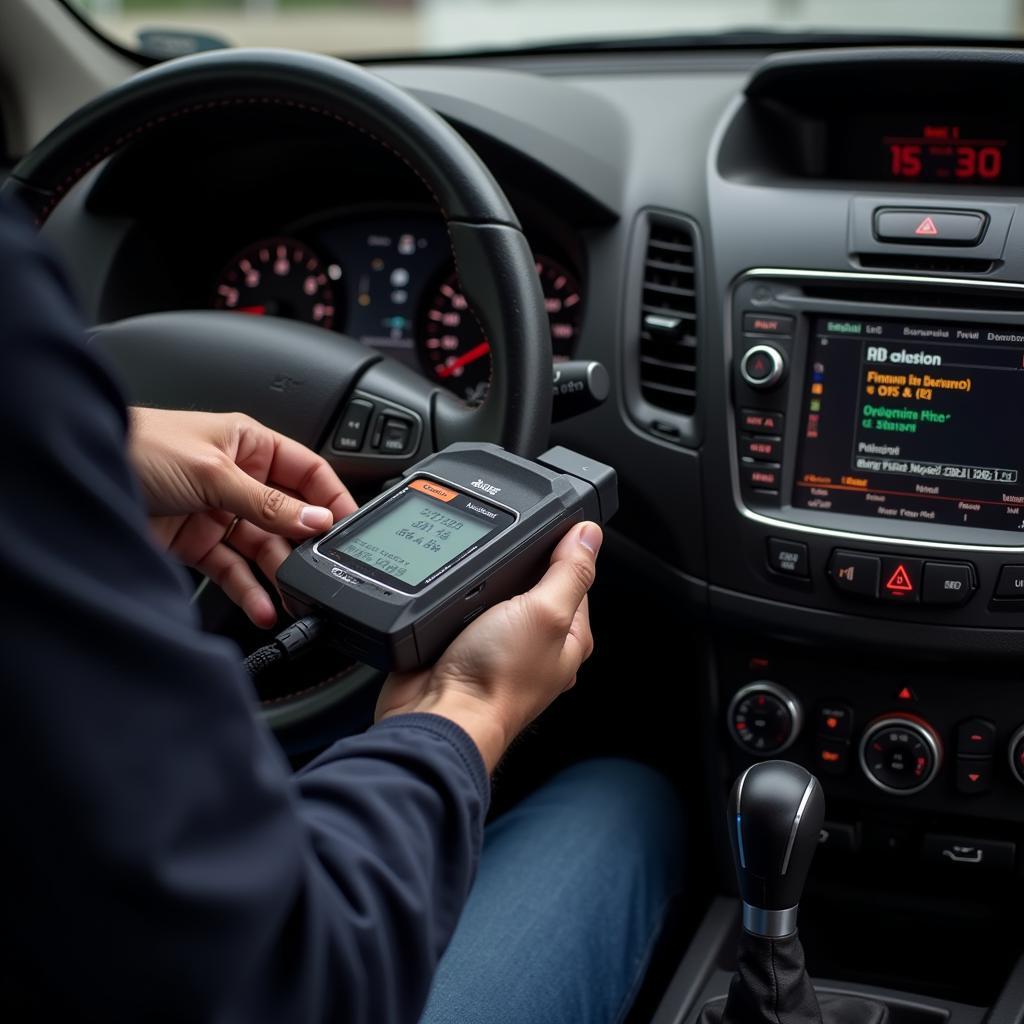A Car And Truck Diagnostic Scanner is an essential tool for any mechanic or vehicle owner who wants to quickly and accurately diagnose car problems. These sophisticated devices connect to a vehicle’s onboard computer system to retrieve data about its health and performance. This data can then be used to identify the root cause of car problems, saving time and money on repairs.
Why You Need a Car Diagnostic Scanner
Modern vehicles are essentially complex computer networks on wheels. They come equipped with multiple Electronic Control Units (ECUs) that manage everything from engine timing to airbag deployment. When a problem arises, the ECU logs a Diagnostic Trouble Code (DTC). A car diagnostic scanner acts as the key to unlock these codes and understand what they mean.
 Mechanic using a car diagnostic scanner
Mechanic using a car diagnostic scanner
Without a scanner, diagnosing car problems often involves a lengthy process of elimination, which can be costly and time-consuming. Here are just a few ways a car and truck diagnostic scanner can be beneficial:
- Pinpoint the Problem: Quickly identify the source of warning lights like the “Check Engine” light and get specific DTCs.
- Read and Clear Codes: Access stored codes to understand the history of vehicle issues and clear them after repairs.
- Live Data Monitoring: View real-time sensor data such as engine RPM, coolant temperature, and oxygen sensor readings to assess vehicle performance.
- Component Activation: Test individual components like fuel injectors or solenoids to verify their operation.
Types of Car and Truck Diagnostic Scanners
There’s a wide range of diagnostic scanners available, each offering varying levels of functionality and catering to different user needs.
- Code Readers: These entry-level scanners primarily read and clear basic DTCs. They are affordable and user-friendly, making them suitable for DIY car enthusiasts.
- OBD-II Scanners: These scanners offer more advanced functionality than basic code readers, including the ability to view live data streams and access manufacturer-specific codes. They are ideal for home mechanics and small workshops.
- Professional-Grade Scanners: These high-end scanners provide comprehensive diagnostic capabilities, including advanced programming functions, bi-directional control, and access to all vehicle systems. They are typically used by professional mechanics and dealerships.
When choosing a car and truck diagnostic scanner, consider your budget, technical expertise, and the types of vehicles you’ll be working on.
Key Features to Look for in a Diagnostic Scanner
Navigating the world of car diagnostic scanners can feel overwhelming with the sheer variety of options available. Here are some key features to prioritize:
- Vehicle Coverage: Ensure the scanner supports the makes and models you work on, including both domestic and import vehicles.
- Code Database: A comprehensive database of DTC definitions is crucial for understanding the meaning behind the codes.
- Software Updates: Regular software updates are essential for compatibility with newer vehicle models and to access the latest features.
- User Interface: A user-friendly interface with a clear display and intuitive navigation will make using the scanner much easier.
- Durability: Opt for a scanner that is built to withstand the rigors of a workshop environment.
Car and Truck Diagnostic Scanner: An Investment Worth Making
Whether you’re a seasoned mechanic or a car enthusiast, a car and truck diagnostic scanner is a valuable tool that can save you time, money, and frustration. By empowering you with the knowledge to understand your vehicle’s health, a diagnostic scanner can make car maintenance less daunting and empower you to make informed decisions about repairs.
FAQ
Q: Are car and truck diagnostic scanners universal?
A: While most vehicles manufactured after 1996 use the standardized OBD-II port, the communication protocols and functions accessible can vary between manufacturers.
Q: Can I use a car diagnostic scanner on a truck?
A: Some scanners are specifically designed for heavy-duty trucks and may not work on passenger cars. It’s crucial to check the scanner’s compatibility before purchasing.
Q: How often should I use a car diagnostic scanner?
A: It’s a good practice to scan your vehicle for codes periodically, especially if you notice any unusual performance issues or warning lights.
Q: Can a diagnostic scanner fix car problems?
A: No, diagnostic scanners are designed for identifying problems, not fixing them. They provide valuable information to guide repairs.
Q: Where can I buy a car and truck diagnostic scanner?
A: Diagnostic scanners are available from a variety of retailers, including auto parts stores, online retailers, and specialized tool suppliers.
Need Assistance? Contact DiagFixPro
For all your car and truck diagnostic needs, contact DiagFixPro. Our team of experts is available 24/7 to assist you with product selection, technical support, and any questions you may have. Reach us via WhatsApp at +1(641)206-8880 or email us at [email protected].

Leave a Reply